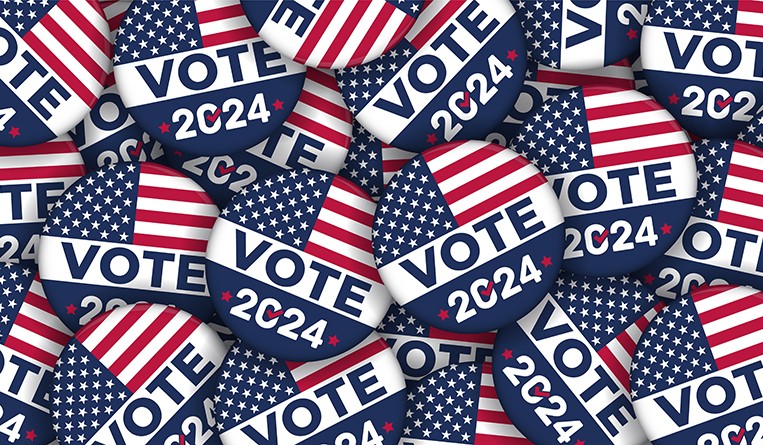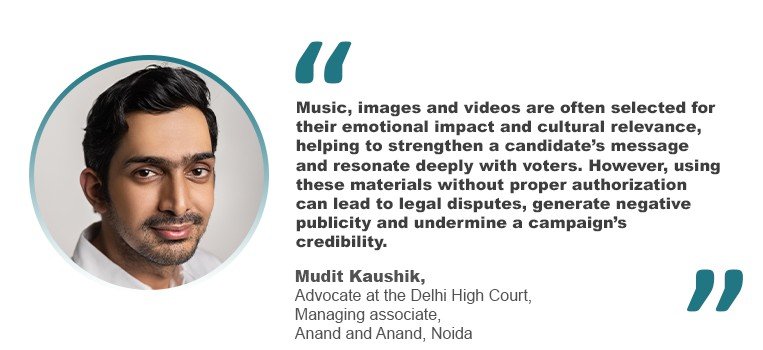IP enforcement, election outcomes and what to expect in U.S. policy shifts
27 September 2024

How critical are intellectual property laws for political campaigns? Excel V. Dyquiangco discusses how upcoming U.S. elections could affect global IP policies, trade agreements and related issues, highlighting the broader implications for political messaging and global IP standards.
Intellectual property laws are crucial in elections, protecting the branding elements like logos, slogans and creative materials that shape a campaign’s identity. These protections prevent unauthorized misuse and maintain the integrity of a campaign’s messaging. However, the fast pace of modern elections and the prevalence of digital media make enforcement challenging.
“The use of copyrighted materials in political campaigns can be a powerful tool, influencing voter perceptions and potentially swaying election outcomes,” said Mudit Kaushik, an advocate at the Delhi High Court and a managing associate at Anand and Anand in Noida.

“Music, images and videos are often selected for their emotional impact and cultural relevance, helping to strengthen a candidate’s message and resonate deeply with voters. However, using these materials without proper authorization can lead to legal disputes, generate negative publicity and undermine a campaign’s credibility.
The legal consequences are particularly serious, as candidates may face lawsuits for copyright infringement, which could distract from their campaign and harm their public image.”
As campaigns become more complex, navigating IP laws is increasingly important. In addition to unauthorized use of copyrighted materials, the rise of deepfake technology further heightens the risk of misrepresentation. “To mitigate these risks, candidates must carefully navigate the boundaries of intellectual property laws,” he advised. “This often involves obtaining licences for the use of copyrighted material or opting for royalty-free alternatives that do not require permission. The doctrine of fair use, which permits limited use of copyrighted works for purposes like commentary or criticism, can sometimes offer a legal defence. However, the application of fair use in the context of political campaigns is often ambiguous and can vary depending on the circumstances, making it a risky approach without legal counsel.”
He added: “In the digital age, campaigns must also monitor how their supporters use and share copyrighted content online. Unauthorized use can quickly spread across social media, leading to further legal complications. Managing these issues effectively requires a solid understanding of intellectual property law and often necessitates collaboration with legal experts throughout the campaign process.”
With copyrighted music, images and videos helping politicians convey their political messages, political candidates should seek IP advice and conduct appropriate legal checks when designing a political campaign or brand to ensure the campaign does not infringe third-party rights or create an implied licence from or endorsement by an artist, said Christopher Young, a partner and head of IP at Minter Ellison Rudd Watts in Auckland.
He shared an example of the importance of political use of copyrighted materials from New Zealand with a 2014 television advertising campaign for the New Zealand National Party (New Zealand’s centre-right party), which was found to infringe the copyright of Eminem’s “Lose Yourself”. Damages of NZ$225,000 (US$138,400) were awarded.

“Where well-known copyright materials are used, under New Zealand law, there is likely to be an implication of consent to use and potential for a claim if an affiliation with or endorsement by the copyright owner is not correct or is misrepresented,” he said, “even where licences might have been obtained through the usual rights licensing organizations, for example, for music. The use of music can still lead to a challenge by the artist if the artist is not comfortable with the political position their music is being used to endorse.”
For example, the band Chumbawamba took issue (through the New Zealand media) with the use of their song “Tubthumping” at political rallies held by New Zealand First, a socially conservative New Zealand political party, on the basis that the band did not support the political views of that political party. “Whether or not use of music by a political party can be prevented at law, for example, if relevant rights body licences were obtained, these types of interactions are often played out in public and can have a detrimental effect on the politician. So, I would normally recommend a cautious approach is adopted ensuring that not only the copyright owner’s licence is obtained, whether through a rights management body or directly, but also that the artist or writer consents to the use,” said Young.
The 2024 U.S. elections and IP policies
With the upcoming U.S. elections featuring Kamala Harris and Donald Trump, the political landscape is set for a dramatic contest. According to Kaushik, this is expected to notably influence intellectual property policies, particularly concerning enforcement and protection, both domestically and internationally.
“Domestically, the election results could shape the approach to IP enforcement, especially regarding digital content and emerging technologies,” he said. “There may be an emphasis on improving patent processes and tackling the increasing challenges posed by digital piracy. This could include implementing stricter penalties for IP violations and adopting a more assertive stance on protecting the interests of industries heavily reliant on intellectual property.”
Internationally, he noted, the election outcome is likely to affect how the United States government engages with global IP standards and trade agreements. “Depending on the administration, there could be a shift towards either more cooperative or more independent approaches to enforcing IP rights worldwide,” he said. “This might involve advocating for stronger IP protections in international trade agreements or reinforcing existing standards to support U.S. businesses in the global market. Additionally, economic competition with other major economies may drive the U.S. to push for stricter global IP norms.”
Kaushik added: “The ongoing development of technologies like AI is also expected to spark further discussions on updating IP laws. The election could influence how quickly and in what manner these laws are revised to address challenges such as AI-generated content, which is increasingly relevant in the creative and digital sectors. The decisions made after the election will likely have long-term implications for both domestic innovation and international trade relations.”
In addition, irrespective of who wins the 2024 U.S. elections, Young noted that the U.S. and many of its key trading partners are parties to the Trade-Related Aspects of Intellectual Property Rights (TRIPS) Agreement. This requires certain minimum standards of protection and enforcement of IP rights, as well as recognizing the IP rights of other member countries.
“The U.S. Republican Party policies are focused on supporting domestic (U.S.) business, so, if elected, this may lead to stronger enforcement and protection standards, for example, in relation to counterfeits,” he said.
On the contrary, in the Philippines, the 2024 U.S. elections will have little influence on enforcement and protection standards for IP. According to Enrique Dela Cruz, a senior partner and data protection officer at DivinaLaw in Manila, the current enforcement and protection standards in the Philippines are determined primarily by domestic laws, which are solely authored and passed by the Philippine legislature. “However, treaties and international agreements to which the Philippines is a party likewise play a role in determining such standards,” he said.
He added: “Notably, the Philippines and the United States of America are parties to international treaties such as the TRIPS Agreement and the Paris Convention. Thus, the 2024 U.S. elections may affect international enforcement and protection standards in case the new administration of the U.S. effectively withdraws from being a state party. Particularly, any reciprocal rights granted under such treaties may no longer be claimed by or enforced against the United States by other contracting parties, including the Philippines, and vice versa.”
Trade agreements and judicial appointments
In terms of trade agreements, its future, particularly those involving IP protections, is under close scrutiny. “Trade negotiations are expected to reflect the administration’s priorities and this could lead to an adjustment in how IP clauses are integrated into agreements with key partners like India. Historically, the U.S. has sought to enforce robust IP standards in its trade agreements, which often means pushing for stricter patent protections and enforcement mechanisms that align with U.S. business interests,” said Kaushik.
India, which has its own set of IP policies tailored to its economic needs, particularly in the pharmaceutical sector, may find itself navigating complex negotiations, he said. The U.S. has frequently emphasized the importance of protecting IP in sectors such as pharmaceuticals and digital media – areas where India has traditionally maintained more flexible standards to support accessibility and innovation. “Future trade agreements could see these issues coming to the forefront, requiring careful negotiation to balance domestic priorities with international expectations,” he said.
“Moreover, the evolution of digital technologies, including AI and cybersecurity, could further influence the direction of IP-related trade negotiations,” he continued. “As these technologies become more integral to global commerce, the U.S. might advocate for updated IP protections that address new challenges posed by these innovations. India, as a significant player in the global technology landscape, would need to consider how these emerging standards align with its own economic strategies and how they might shape future trade relations with the U.S. The outcome of the 2024 elections will thus play a crucial role in determining the contours of these discussions.”
Meanwhile, trade arrangements between New Zealand and the U.S. have not been a priority for the current U.S. administration or its predecessor. The U.S. signed the Trans-Pacific Partnership Agreement (TPP) in February 2016 – this was a trade agreement between 12 Pacific-rim countries, including New Zealand, Australia, Canada, Japan, Singapore and the U.S. When Donald Trump took office as president in January 2017, the U.S. withdrew from the TPP and negotiations with the U.S. have not resumed.
“The IP aspects of the TPP included extending the term of copyright protection to 70 years and patent protection for pharmaceuticals,” said Young. “The U.S. was the first mover to increase the term of copyright protection to 70 years back in 1998 and this has been of significance in trade negotiations for countries where copyright protection is shorter, as it raises tension with businesses in those countries that may wish to freely use copyright from the U.S. Although the U.S. withdrew from the TPP (which would have required a 70-year copyright term), New Zealand’s trade agreements with the UK and EU have led New Zealand to agree to increase the copyright term to 70 years anyway.”
He added that the 2024 Democratic Party platform references strengthening ties in the Asia-Pacific region, including with Australia. However, it is unclear whether this would extend to a new trade agreement with New Zealand. “Unless the U.S. resumes trade negotiations, it is unlikely to be able to negotiate significant concessions on IP policy in the Pacific region,” he said.
In judicial appointments affecting IP litigation and the interpretation of IP laws in the U.S., Young pointed out that the interface between AI and copyright law is one of the most topical IP issues before the U.S. courts. In particular, there are various ongoing cases relating to claims that AI models have been trained using data that is the copyright of a third party. “The composition of the judiciary could impact how these issues are decided, which could shape the law in this area,” he said.
In the Philippines, the judiciary is responsible for settling controversies involving rights that are legally demandable and enforceable. “The demandability and enforceability of such rights are determined by laws,” said Dela Cruz. “The judiciary’s role involves interpreting these laws based on their wording and, in case of ambiguity, the legislative intent. This interpretation is critical in rendering judgments on specific cases.”

He added: “Should the U.S. adopt a similar judicial mechanism, the influence of judicial appointments on IP litigation and the interpretation of IP laws could be substantial. The new administration may appoint judges or justices whose views align with its policy positions on IP matters. Such appointments could lead to specific interpretations of IP laws, impacting litigation outcomes and case adjudication. Additionally, the impact on IP litigation and interpretation of IP laws in the U.S. by the new judicial appointees may be anticipated based on their previous IP practice and judicial track record.”
Technology and AI
About technology and artificial intelligence, Dela Cruz said that the shift in U.S. IP policy following the 2024 elections is contingent on the policies set by the new administration. “Consequently, the impact on global technology transfer and collaborative research efforts between the U.S. and Asia will be substantially shaped by the policy directions of the new administration,” he said.
“A prominent example of U.S. and Asian collaboration in global technology transfer is the development of artificial intelligence through the Global Partnership on Artificial Intelligence (GPAI),” he pointed out. “This initiative aims to advance AI responsibly by creating a partnership among member countries, including the U.S., Japan, Israel, India, Turkey, Singapore and South Korea, and fostering an avenue for discussion, collaboration and discourse in creating global AI policies.”
“Should the U.S. adopt more stringent policies regarding technology transfers, this could potentially hinder the effectiveness of the GPAI and related collaborative efforts with Asian nations. Conversely, more flexible policies could enhance and further strengthen these partnerships,” he said.






